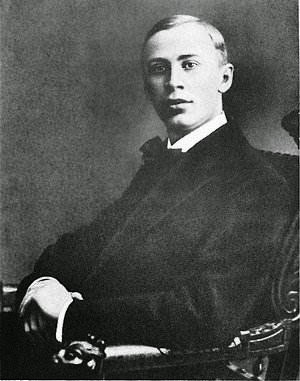Spring Symphonies: 51/60 - Prokofiev: Symphony No 1 "Classical"
Time is pressing as April comes to an end and there are so many works still to explore. The symphonies heyday seems to be over and even though there is a pleasing trickle of new symphonies into the canon it’s not been the torrent it once was. Imagine the day when Beethoven premiered his Fifth and Sixth symphonies at the same concert. That wouldn’t happen now.
One of the most pleasing resurgences of the symphonic form was in the neo-classical idea picked up by Stravinsky and in this case Prokofiev. Prokofiev was quite specific in his goal - to write a symphony like Haydn or more precise in a style that Haydn would have used if he had been around in Prokofiev’s time. In his first symphony he paid tribute to the great symphonist with a work of some style, wit and aplomb. It’s worth noting that Prokofiev was setting the bar high for his first symphonic opus. But the 26 year old Prokofiev was nothing if not precocious. It was completed in 1917 and is credited with one of the first neo-classical pieces.
The movements are simply delineated (Allergo, Larghetto, Gavotta: Non Troppo allegro and Finale: Molto vivace) and it is - like his first piano concerto - a short work.
The symphony has a opening chord of salutation and then slips with easy chair into a slightly rhetorical first subject, the violins providing an ongoing accompaniment. The second subject is slower and in a different mode. The whole thing has a style that is all Prokofiev’s and yet one can just stretch the imagination to Haydn using these resources. The differences arise in use of percussion and brass mostly and the thickness of the orchestral textures (modern instruments probably allowing a for a bit more delineation of lines).
The Larghetto starts as a Haydn slow movement might but soon lifts into swooning and swaying dance movement of great poise and engrossing orchestration. It lasts under 4 minutes and one might imagine that Haydn or more likely Mozart might have repeated date whole lot. But it’s a degree more nonchalant and stylish than either would have set out in their 18th Century formalism.
The Gavotte is somewhat more sure-footed, though perfectly danceable. There’s a wit here too, the central section is gleaming and the solo flute charming. All in all the young Prokofiev shows himself to be a class act. It’s less than 2 minutes long.
The Finale is brilliant (in the scintillating sense) and I imagine way beyond the the capability of Haydn’s players or more particularly their instruments. The dazzling orchestration is no bigger in forces than a small’ish Haydn on the string, wind and brass side. The music whizzes along style if not panache at every turn of it’s every gesture. This big bold statement is nearly four and a half minutes long! The mood is enthusiastic , elevating and somewhat cheely.
There’s something about Prokofiev’s turn of phrase which is more elegant than Shostakovich and whilst we have plenty of music from both which is joyful not much in Shostakovich gets this close (except perhaps the finale of the Sixth symphony).
The fate of the young man who wrote this symphony was not as joyful as this symphony. His life as a puppet of Stalin led to compromises, bans and many think ill health. He never escape date yoke of Stalin and spent the last years of his life suffering ill-health in Russia. This must have been terrible for the man who delighted Paris and showed so much invention and class early on. I think I have come to look on Prokofiev’s as a rather tragic life - too much riding on all those prizes the ruling committees handed out, all those rules, unwritten and scarcely spoken dictats. I don’t think Prokofiev’s music in symphonies was ever as free as this again - the tragedy of Soviet rule is that the sheer joy in music was always compromised.
The fate of the young man who wrote this symphony was not as joyful as this symphony. His life as a puppet of Stalin led to compromises, bans and many think ill health. He never escape date yoke of Stalin and spent the last years of his life suffering ill-health in Russia. This must have been terrible for the man who delighted Paris and showed so much invention and class early on. I think I have come to look on Prokofiev’s as a rather tragic life - too much riding on all those prizes the ruling committees handed out, all those rules, unwritten and scarcely spoken dictats. I don’t think Prokofiev’s music in symphonies was ever as free as this again - the tragedy of Soviet rule is that the sheer joy in music was always compromised.
I’m convinced that this symphony would have met with a wry smile by Haydn.
Here’s Thomas Søndergård conducting the Danish RSO:-
https://www.youtube.com/watch?v=p5jL6Ma9tvk
The trouble is that some conductors don’t take this music in the spirit in which I think Prokofiev meant it. It’s a shame to take it out of context. For a performance that I think completely defeats the object watch Gergiev turn the work into a exercise in orchestral control here:-
https://www.youtube.com/watch?v=co-gL6pskwQ
https://www.youtube.com/watch?v=p5jL6Ma9tvk
The trouble is that some conductors don’t take this music in the spirit in which I think Prokofiev meant it. It’s a shame to take it out of context. For a performance that I think completely defeats the object watch Gergiev turn the work into a exercise in orchestral control here:-
https://www.youtube.com/watch?v=co-gL6pskwQ



Comments